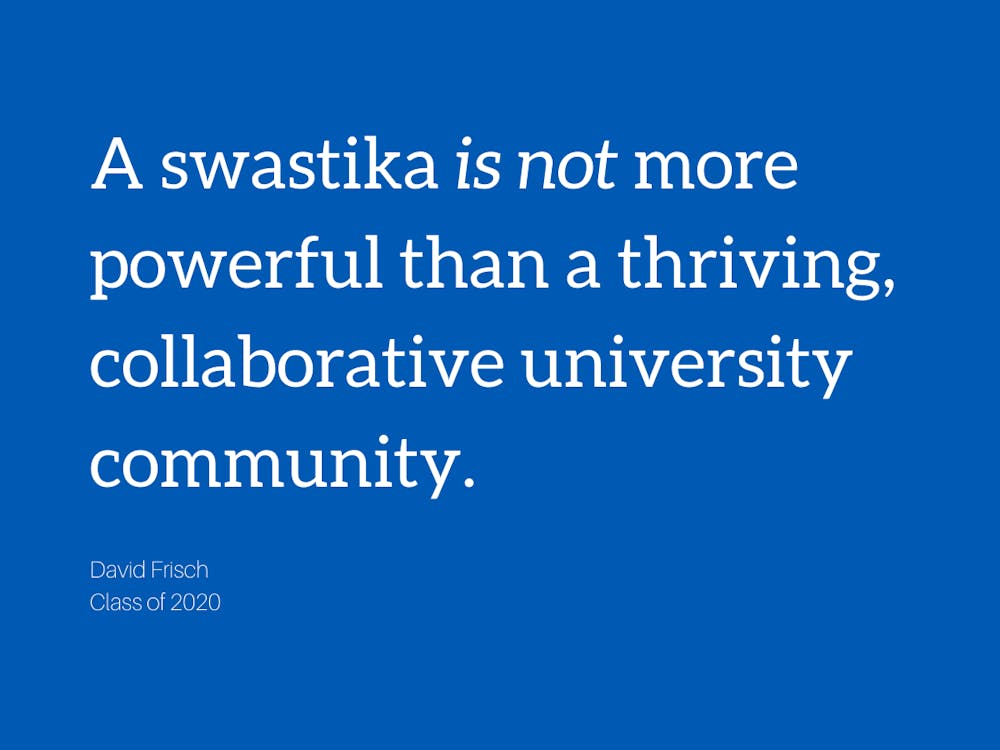A swastika is serious. When I was twelve years old, a classmate at my Jewish day school drew a swastika in the playground dirt. He was chastised but meant nothing by it. The symbol had been present in our holocaust class and in his WWII video games, but never in our own lives. He knew but didn’t understand its meaning.
Almost a decade later, hatred shot cold metal bullets into warm, familiar faces at the Pittsburgh synagogue where my parents got married. Family friends lay shattered beside our own sense of safety.
In this new—yet deeply familiar—context, four attached right-angles re-asserted their horrific significance. Last fall, swastikas on pumpkins and murals tore through my Duke bubble like a metal throwing star. When someone spray-painted a swastika over Duke’s memorial mural to Pittsburgh’s victims and then again under the same bridge on Wednesday, I was unsurprised yet unsettled. As hateful acts transcend my spheres of interaction, my Jewish identity becomes my sanctuary—hopefully more bulletproof than the one back home.
Each anti-Semitic act makes the perpetration of another more likely. The swastika is a threat and a call to action. It rallies hatred to reveal itself. To embolden. As a campus, we must heed that same call. Our action, however, must be different. We must love and listen. The best way to discourage people who wish to weaken and divide us is to respond to their hatred with greater strength and unity.
A swastika is not more powerful than a thriving, collaborative university community. It offers no argument or refutation. Whatever feelings it initially elicits, a swastika does not diminish the value of Judaism’s core teachings. For thousands of years, my tradition was forged in the fire of persecution far hotter than today’s. Whether read as fact or parable, word of God or the thoughts of humans, the stories and teachings that fortified my ancestors in hardship are particularly salient in the wake of hateful acts.
The Judaism that educated me declares the infinite worth and dignity of human life. Our scripture teaches that to save a single life is akin to saving the whole world. Our practice of keeping kosher reminds me that human life is not merely mechanistic—that it matters how we care for and sustain ourselves. In scripture, on Passover, and in times of trial, I remember that my responsibility to defend the dignity of human life extends beyond the Jewish people. As it is written, “you should love the stranger as yourself for you were strangers in the land of Egypt.” As a swastika calls on others to hate, our hardship calls on us to care.
These are core lessons from the Judaism that raised and revives me. They arise in different forms across cultures and borders, finding strength through repetition and discussion. Here, they live in dialogue with each other. I am daily grateful for the Duke community that surrounds me. Students, classmates, staff, administrators, and professors live committed to variations of the principles I hold most dearly. Often, respect and careful deliberation determine how the wisdom and experience of my tradition and others’ can participate in our ongoing, collective project of forming university life. Collaborative cross-cultural dialogue should be our standard. Duke teaches and listens. Its openness to the beauty of diversity, difference and disagreement must remain the cornerstone of our community. On that rock, Duke must build its churches, its synagogues and its many centers of community and compassion.
David Frisch is a Trinity senior.
Get The Chronicle straight to your inbox
Signup for our weekly newsletter. Cancel at any time.

